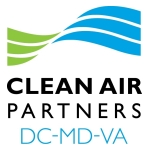Clean Air Partners Offers Simple Steps to Reduce Air Pollution and Protect Public Health
BALTIMORE & WASHINGTON--(BUSINESS WIRE)--Over the past year the pandemic has changed how millions of Americans work and live, with more people working from home or limiting their driving. This has had a dramatic impact on the air quality of the Baltimore-Washington region, which saw some of the cleanest air in ten years. As it launches its annual ozone season public education campaign, Clean Air Partners is urging area residents to keep up the good habits they started during the pandemic. The campaign takes place in conjunction with Air Quality Awareness Week, May 3–7.

Cleaner air means improvements in public health, especially among people with respiratory illnesses. Particles in the air can aggravate asthma, which affects 200,000 children and 700,000 adults in the region. Research shows that asthma attacks, heart attacks, and emergency room visits all go up when air pollution levels increase.
“This past year has shown us what a difference decreases in air pollution can make in the quality of the air we breathe,” said Janet Phoenix, MD, MPH, and Clean Air Partners Board Member, Breathe DC. “In some cases, we haven’t seen air this clean in a decade. Clean air has a big impact on helping improve our overall health.”
Air quality conditions have been helped by people taking up healthy habits during lockdown. The TPB Voices of the Region Survey found that 50% of respondents were walking more and 17% were biking more. More than a third (38%) said they expected to have different travel habits even after the lockdown ended. All of this led to less driving, and less driving means less air pollution and more money in drivers’ pockets as they save money on fuel.
The past year has shown how everyday actions really do affect air quality. By keeping some of the good habits adopted last year, area residents can help keep the region’s air pollution-free. To help them protect their health now and when vehicles return to the streets in greater numbers, Clean Air Partners is turning to social media to promote simple tips that reduce pollution and save money:
- When air quality is unhealthy, limit outdoor activity. This applies especially to sensitive groups.
- Set your thermostat a few degrees higher and use a fan to keep cool and reduce energy consumption.
- Use caulk/weatherstripping to weatherproof your home.
- Change heating and air conditioning filters every month.
- Turn off lights and appliances when not in use.
- Replace incandescent light bulbs with energy efficient CFLs or LED bulbs.
- Use power strips to reduce electricity use by shutting down power to devices in standby mode.
- Keep driving to a minimum. Telework; limit trips. Fill up your gas tank during evening hours.
- Postpone mowing and trimming on poor air quality days or use electric garden equipment.
Clean Air Partners offers fun and educational activities and social media challenges as part of Air Quality Awareness Week efforts. Clean Air Partners also provides educators free online curriculum resources with activities that teach students about air pollution issues and solutions. Find them at https://www.ontheair.cleanairpartners.net.
Clean Air Partners is a public-private partnership educating the greater metropolitan Baltimore-Washington region about health risks associated with poor air quality and the impacts everyday actions have on the environment. Since 1997, Clean Air Partners has been dedicated to empowering individuals and organizations to take simple actions to reduce air pollution, protect public health, and improve air quality.
cleanairpartners.net
Contacts
Jeff Salzgeber, jeffs@sherrymatthews.com, (512) 743-2659
e riproduzione totale o parziale in qualunque formato degli articoli presenti sul sito.
















